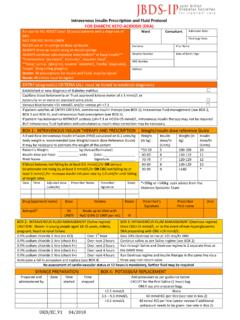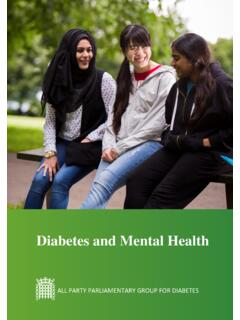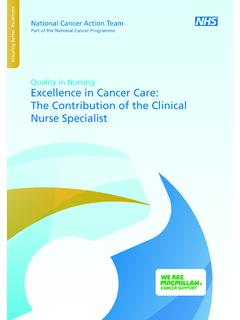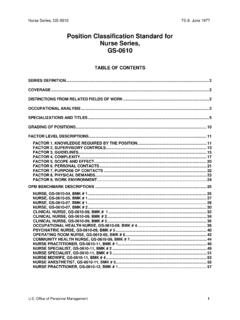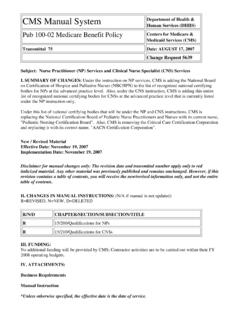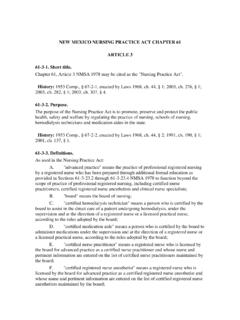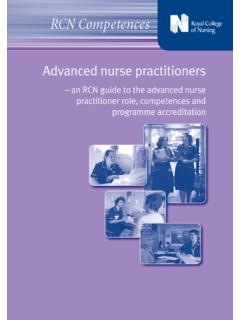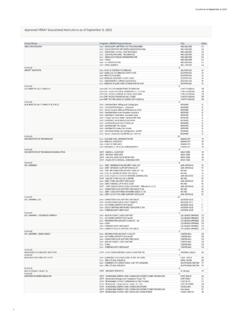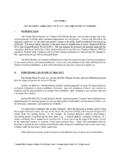Transcription of Diabetes Specialist Nurses
1 position STATEMENT Title Date Diabetes Specialist Nurses : Improving Patient Outcomes and Reducing Costs February 2014 Key points A joint position statement from Diabetes UK, TREND-UK and the Royal College of Nursing 1. Diabetes Specialist Nurses (DSNs) are central to good patient care and outcomes including confident self-care management. 2. Evidence shows that DSNs are cost effective, improve clinical outcomes and reduce length of stay in hospital. 3. We condemn the stagnation of DSN numbers as wholly inappropriate in light of the rapid rise in numbers of people with the condition and calls on employers to recognise and respond to projected further increases of Diabetes with appropriate workforce planning. 4. The current practice of recruiting less qualified/experienced Nurses into Specialist roles in the pursuit of short term cost-savings is short sighted and minimum competencies (as described by TREND-UK) should be applied across the NHS.
2 5. The value of DSNs will not be fully realised unless they are employed with access to appropriate clinical supervision and hold a clinical case load of patients with complex Diabetes care needs. 6. Minimum staffing levels should be at least five DSNs per 250,000 population and at least one Diabetes inpatient Specialist nurse per 300 beds1 Introduction The Diabetes Specialist Nurse or DSN role has been around for 60 years. It was developed, and continues to develop to specifically meet the needs of people with Diabetes and their families, to provide experience and expertise as part of dedicated Diabetes teams and to support other health care professionals in the care they provide. DSNs are crucial in supporting independence and in helping people self manage their Diabetes more effectively. They play a vital role in preventing expensive complications, in supporting people with complex needs and, critically, in providing primary care teams with Specialist expertise that reduces emergency hospital appointments.
3 2 There is a growing body of evidence to support the importance of DSNs in both improving patient care and reducing costs to the NHS. Clinical studies suggest that Specialist Diabetes inpatient teams can reduce prescribing errors, improve patient outcomes, reduce length of stay, increase day case rates and reduce the number of The savings from the introduction of such teams can substantially outweigh the cost of the team. 3 Despite these benefits to patients and healthcare providers, at Diabetes UK we are increasingly noticing a worrying trend; DSN posts being left frozen and unfilled and new DSN posts recruiting staff without appropriate qualifications and experience (and of course paying less). We are deeply concerned that the result will have a significant impact on people with Diabetes as they receive poorer quality care. Patients report that seeing a DSN, even once or twice, instigates total change to independent condition management.
4 3 Whilst a 2012 randomised controlled trial looking at the cost effectiveness of DSNs showed that instigating a DSN as a central carer provides opportunities to achieve cost reductions. 4 In light of this cutting DSN s clinical contact is deeply illogical. This position statement describes the current situation facing Diabetes care in the NHS; the business case for DSNs; and, calls on healthcare providers and commissioners to ensure that patient safety and wellbeing is not compromised in the pursuit of short-term cost savings. Current situation What is the role of DSNs? DSNs work wholly in Diabetes care. They may be employed and work in primary care; secondary care providing inpatient care; intermediate care working in the community; or, in a mixture of these settings. A DSN s clinical caseload might encompass the care of adults or children with Diabetes , or both. DSNs are usually members of multidisciplinary teams, although not all of them work with the recommended clinical and governance support of a consultant Specialist in Diabetes care, as recommended in the Royal College of Nursing report defining such roles5.
5 The DSN is often the first point of contact for patients, referring them to other Specialist services that are appropriate to their needs. Clinical care should take up about 50-60% of a DSNs time. The rest would include patient and staff education, whilst more senior and experienced DSNs take on other elements such as audit and research and guideline development. In 2010 research showed 41% have undertaken non-medical prescribing Specialist (adult and paediatric) Diabetes teams, which include DSN skills, provide direct care for people with Diabetes with complex needs that cannot be met within the skill competencies of the general practice team. Examples include: people newly diagnosed with Type 1 Diabetes people with Type 1 Diabetes (for carbohydrate counting and/or the use of insulin pumps/or continuous blood glucose monitoring) children and young people (transition clinics) with Diabetes pregnant women and those planning a pregnancy patients with significant and ongoing cardiovascular or peripheral vascular disease young patients with Diabetes of an undefined nature patients with active foot ulcers or uncontrolled neuropathic pain patients with Diabetes and advanced renal disease or retinopathy requiring active management or complex monitoring people whose risk factors for complications have been unsuccessfully controlled in primary care patients with acute complications including Diabetic Ketoacidosis and Hyperosmolar Hyperglycaemic state (HHS)
6 Patients with neuropathy, especially autonomic neuropathy inpatient In addition DSNs will have responsibility for supporting the wider health system as follows: Implementation of Specialist Diabetes education to support self-management and patient empowerment Supporting nursing homes, care homes, mental health units and other Specialist settings to deliver appropriate Diabetes care Delivering training and mentoring in Diabetes to other healthcare professionals Insulin initiation in people with Type 2 Diabetes Ensuring the 15 Healthcare Essentials are carried out across the system7 What is the business case for DSNs? The incidence of Diabetes is predicted to increase to 5 million by 2025. It is essential that steps are taken to increase the NHS s capacity to care for people with Diabetes in a cost effective manner. The body of evidence shows that Diabetes Specialist Nurses are a key part of cost effective care.
7 A randomized controlled trial showed Diabetes Specialist Nurses are potentially cost saving by reducing hospital length of stay. There was no evidence of an adverse effect of reduced length of stay on re-admissions, use of community resources, or patient perception of quality of care. 8 Whilst a similar trial in Norfolk and Norwich University Hospital NHS Trust concluded Diabetes excess bed occupancy was [..] reduced notably following the introduction of a DISN [ Diabetes Inpatient Specialist Nurse] service. 9 Evidence also demonstrated that in a district hospital study a DSN with Nurse Prescribing skills significantly reduced insulin error and this led to reduced length of A 1000-bed hospital that employs a Diabetes Specialist team including DSNs with staffing costs of 170,000 a year can save between million and million annually on other NHS costs, which includes reducing hospital stays for these patients by days.
8 11 The Diabetes Inpatient Satisfaction Study (DIPSAT) showed that patients were statistically more satisfied with inpatient care if seen by a Nurse consultant- and DSN-led services are clinically effective; patients achieved significant positive clinical outcomes in HbA1c and cholesterol reduction in direction of NICE targets. Feedback showed high patient satisfaction and increased confidence in ability to self-manage. 13 A survey of over 400 people with Diabetes in July 2013 showed the majority of education courses for managing Diabetes are delivered by DSNs (82%).Following attendance of these courses, 80% of people felt that their knowledge and understanding of how to manage their Diabetes had What is happening to DSN roles in the new NHS? Between 2010 and 2012 the levels of diagnosed Diabetes for England (as recorded by QOF) rose by 10%. Yet in the same period there was a fall of 3% in the number of sites who employ any Diabetes Specialist The rate of diagnosed and undiagnosed Diabetes is projected to increase by a further 15% to As the Royal College of Nursing pointed out in their November 2013 Special Report, Frontline First, rising levels of Diabetes contribute to a significant increase in demand for nursing.
9 17 Yet, in October 2013 a survey of 71 nurses18 working in Diabetes care found that: Over 20% reported that their posts had changed to include less patient contact in the last 2 years (largely because of increased admin and data work) Over 50% reported problems getting time to attend training and 55% reported problems securing funding for training 20% reported being re-graded at a lower band in the last 2 years, whilst 17% were in the midst of having their posts reviewed/re-banded 18% reported DSN vacancies in their trusts 48% were due to retire within the next 10 years18 Similarly, the Association of British Clinical Diabetologists (ABCD) surveyed their members in November 2012 and found that 41 DSN (or nursing) posts were reported as frozen or removed in service redesigns (including 4 paediatric DSNs) - in 25 cases this was the result of a vacancy freeze. The latest National Diabetes Inpatient Audit (2012) showed that just under one third of [hospital] sites still have no specific Diabetes inpatient Specialist Nurses (DISN).
10 19 Diabetes UK is aware of areas where DSNs are facing redundancy or re-banding at lower levels, but in the current climate Nurses are unwilling to speak out about cuts for fear of the impact it might have on their future employment prospects. It is important to note that the 2013 survey of nurses18 found 16 different Diabetes nursing job titles- making it more confusing for patients and professionals to know whether they have the appropriate support in place to assure safety and confidence in the system. The competencies are clearly defined by TREND-UK Guidance, An Integrated Career and Competency Framework for Diabetes Nursing 20, but there remains considerable confusion amongst patients, professionals and commissioning organisations about what skills and experience are required to have the official title of DSN. This is because there is no accreditation of the role and remains no satisfactory process for assuring competencies and skills of the nursing staff employed.

